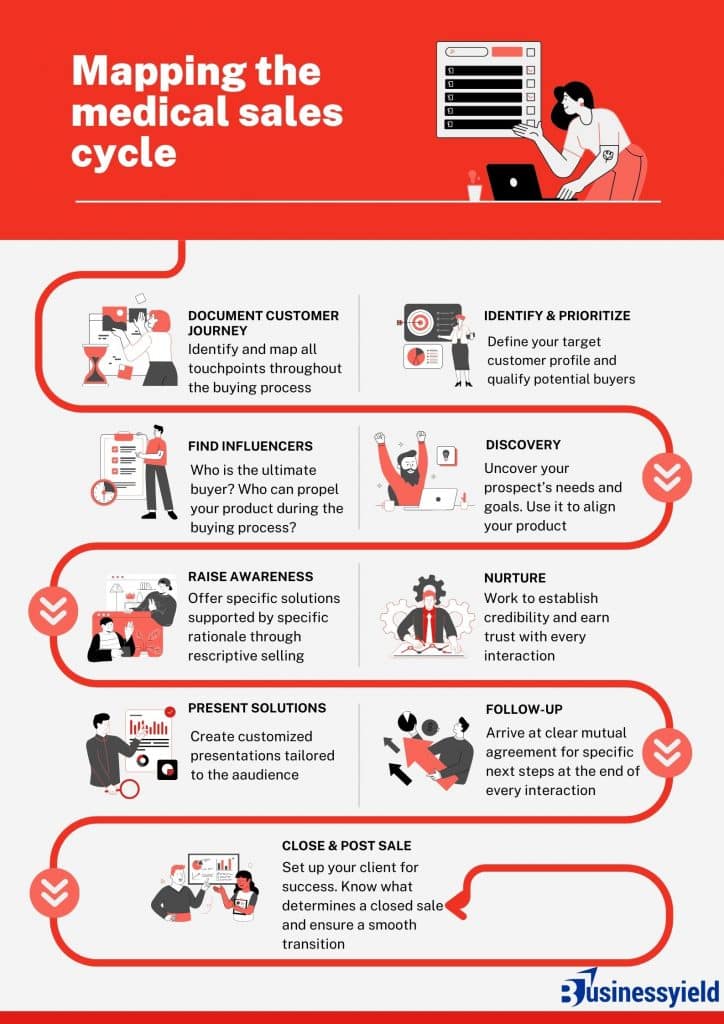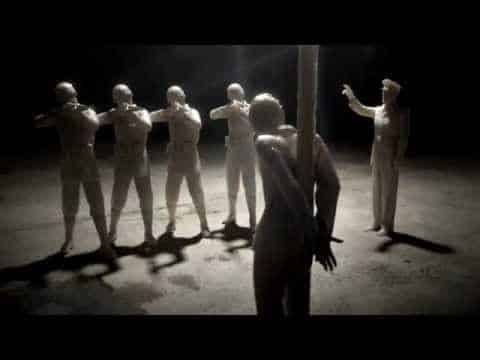Are you seeking to get into the world of medical sales but have no experience? Well, neither do I, but I will show you how I’d go about it if I wanted to. And, who knows, maybe at the end of this article, I might even start considering a career in medical sales.
But first of all, what are medical sales? And what does it entail?
Who is a medical sales rep?
A medical sales rep sells a company’s products, whether for pharmaceutical companies or healthcare equipment manufacturers, serving as the liaison between the customers and the manufacturer.
As a medical sales rep, you will promote the features and benefits of the company’s products, answer questions, and provide consultation on how to use the product. You will also introduce new products as they launch.
Medical sales jobs will always be in high demand. Despite the adoption of automation in nearly every aspect of business, medical sales is one of the few industries that remains largely face-to-face. In addition, an aging population keeps the field relevant and important.
While it’s true that medical sales is a highly competitive field and the workload is demanding, if you’re up to the challenge, it’s possible to begin building your career and making a name for yourself almost immediately.
SEE: What IS TECH SALES? Why & How You Can Get Into It
Responsibilities of medical sales reps
Medical sales reps handle all stages of the medical sales journey, but some places need more attention than others.
Here are some especially important responsibilities:
- Identify and qualify prospects and decision-makers. Who’s on the buying committee? Are you communicating with, and convincing, everyone who has veto power? You could be talking to administrators, doctors, nurses, and therapists. They’ll all have different questions and concerns.
- Product knowledge is key. You will have to demonstrate your product formally and informally. Know your product, read the studies, and be able to provide any additional research prospects may request.
- Presentation skills are needed for meetings, conferences, and trade shows. Provide valuable information in every setting and demonstrate that you understand their challenges and needs.
- Negotiate the sales contract. This is the age of value-added care. How do your product and your contract provide value-added care to the buyer and their patients?
- Know the HIPAA regulations as they apply to business associates. You may come in contact with protected health information (PHI). Prove you’re a trustworthy professional who won’t expose your customers to potential HIPAA headaches.
- Develop and maintain relationships with past, present, and future customers. Be a valuable resource. Providing useful information, like new studies or relevant news articles, is a great way to keep in touch.
How to become a medical sales rep

The first step to becoming a medical sales rep is to choose a specialization. These include medical devices, medical equipment, pharmaceuticals, and biotechnology. Next, you’ll gain field experience and enroll in training. You’ll also network, grow your online presence, and connect with industry contacts.
Here’s what you need to do to break into medical sales:
1. Choose a specialization
Finding the right fit begins with exploring your personal and professional interests. Above all, you must be certain that you have a real passion for the field. Medical sales is highly rewarding, but it require a solid commitment. If you’re not truly passionate about the industry, you risk becoming overly stressed and frustrated.
Medical sales encompass a variety of concentrations, including:
- Medical devices
- Medical equipment
- Pharmaceuticals
- Biotechnology
With such diverse options available, job seekers can find an aspect of medical sales that appeals to them and suits their skills. Below are some articles on sales techniques that can help you in your journey:
- Inside Sales vs Outside Sales: Ways to Balance the Roles for Growth
- What the Challenger Sales Model Is and How to Use It for Better Outcome
- Choosing Upselling & Cross-selling Strategies to Strengthen Your Sales Approach
Most medical sales jobs are transactional, but some involve consultation. In most cases, you’ll be meeting with healthcare professionals to discuss your products’ benefits. Some medical sales positions (such as medical coding sales) also incorporate skills like billing and marketing.
Meanwhile, medical sales recruiters are focused on sourcing and placing the best and brightest professionals in the field.
2. Gain field experience
Once you’ve discovered which medical sales niche you’re most interested in, it’s time to earn some experience.
You’ve already spent a great deal of time and money earning degrees and certifications, and those will certainly help. Still, most recruiters place a high value on work experience. This means you should explore opportunities where you can gain experience in the field immediately. These include:
- Internships with medical sales companies
- Job shadowing with an established medical sales rep
- Volunteering at a hospital or doctor’s office
You can also gain experience by taking an entry-level job in a medical-related or sales field, such as doing marketing for a medical office, customer service in a hospital, or even vending sales in a hospital setting.
Most medical sales jobs do not require specific certifications. Since these positions rely heavily on transferable skills, most positions require job seekers to have an undergraduate degree, but not in a certain concentration. Instead, recruiters seek ambitious, dedicated candidates. Some of the necessary skills include:
- Passion for sales and marketing
- Excellent interpersonal communication
- Positive attitude and strong work ethic
- Close attention to detail
- Organization
- Compassion
- Flexibility
- Desire to help people and have a meaningful impact in their lives
The technical skills in demand for medical sales jobs include:
- Familiarity with Microsoft Office
- Technical writing
- Familiarity with project management tools (Basecamp, Trello, Harvest)
- Social media experience
- Big data analysis
3. Enroll in online or in-person training
Once you’ve determined your strong points and have a handle on the requisite skills, start training.
Medical sales employers will expect you to quickly learn the company’s processes and procedures. You must prove that you’re willing and able to commit to training, so you’re ready to sell in your first week. Signing up for a medical sales training program on your own can give you a head start.
For instance, MedReps partners with Scott Moldenhauer, president of Persuasion Consultants, LLC — a medical sales training and consulting firm focused on helping job seekers in the medical and pharma sales industry. Other training opportunities are available online through sites such as Medical Sales College and Sales Momentum.
Regardless of the program you choose, you must be well-versed in the current trends and best practices of the industry. That includes industry-specific lingo.
You can also get started by Googling industry jargon in your chosen concentration, and medical sales is no exception. For instance, when a professional uses the term ‘ANSI,’ they are referring to the American National Standards Institute. DHR means Device History Record. There are many more of these shortcuts to learn.
Lastly, learn and stay on top of emerging trends in technology central to medical sales, such as:
- Wearable tech
- Artificial intelligence (AI) and robotics
- 3D printing and desktop manufacturing
READ: Mastering E-commerce Optimization: Strategies for Maximum Sales Growth
4. Network and build relationships
Professional networking is important in any field, but in medical sales, it’s essential. While the industry gets larger every day, you’ll likely encounter the same people as you progress in your career. That’s why you need to be able to show you’re able to build and maintain lasting professional relationships.
Having industry contacts will also greatly improve your job placement chances. Recruiters want to know that other people trust and believe in you—personally and professionally. Mastering the art of networking sets you apart from other job seekers and shows that you’re focused on more than just earning the necessary credentials.
Even if you don’t currently have connections, you should be able to prove you’re a people person. This means getting recommendations and character references from a variety of people, including:
- University professors
- Former employers
- Professional contacts
- People you’ve done business with
- Landlords
LinkedIn allows users to collect recommendations and references from anyone within their network. It’s wise to join networking groups as well, both in person and online.
Below is a checklist of the steps outlined above, which you can follow on your journey to becoming a medical salesperson even without experience:
How to get into medical sales with no experience
Getting into medical sales: What hiring managers look for
Hiring managers have a specific set of skills they are looking for in the ideal candidates for medical sales. According to MedReps.com, the talent acquisition strategy includes a search for:
- Foundational Skills
- Industry-Specific Skills
- Transferable Skills
Let’s take a closer look at the three skill types and some examples of each.
Foundation skills
Foundational skills are fundamental and imperative for the position. These skills are not specific to the medical industry but are necessary for success in medical sales. Examples of foundation skills include:
- Sales Skills. As a medical sales rep, you must have new business development and prospecting abilities, presentation proficiencies that communicate features and benefits, and an aptitude for self-discipline to stay on top of new technology and research in your field. You should also be able to set and achieve goals.
- Self-Management Skills. You must have adequate time management skills. You need to be self-motivated and able to set goals and create systems to achieve those goals. Also, you should have a positive attitude accompanied by a strong work ethic.
- Interpersonal Skills. To be a medical sales rep, you should be an active listener who is comfortable with collaborative work environments. You must also possess excellent problem-solving tactics.
Finally, you must be able to adapt quickly to change, as the medical sales industry is always evolving.
Industry-specific skills
Industry-specific skills refer to those skills directly related to the healthcare industry. These might be from work experience or education.
Some examples of industry-specific skills include:
- Relevant Experience. The best candidates for a job in medical sales are those who have already been in medical sales. According to Elitemed, a recruitment firm for medical sales, hiring managers often want to hire reps with at least two to three years of experience in the field.
- Healthcare Professionals. If you’ve worked as a nurse, scrub tech, or some other healthcare provider, you will be an excellent candidate, since you already have industry knowledge. Elitemed says healthcare professionals understand the hospital environment and speak the same language as the customer.
- Biotechnology or Science Background. Candidates with education in scientific fields have an advantage in medical sales. MedReps suggests people with a scientific background often also have technical writing skills and can explain things well in regular language. These candidates are also familiar with research and using evidence-based claims to convince customers of the product’s benefits.
Transferable skills
Transferable skills are those abilities acquired through other occupations. These competencies are not specific to medical sales but instead are work-related talents gained through experiences in different positions.
Some examples of transferable skills include:
- Public Relations. Communication is significant for medical sales reps. Hiring managers want medical sales reps who can present to an audience, answer questions, and disseminate information about the products. They also want people who can handle customer concerns and overcome objections.
- Marketing Flair. You will be in demand if you know how to promote the features and benefits of a product to a specific audience. Knowing how to use different channels to reach potential customers or expand relationships with existing customers is key to a medical sales rep’s success.
- Project Management. Desirable candidates will have project management aptitude. Running a medical sales territory has many moving parts, and the best candidates can develop systems to help them manage and organize their territory to meet the expectations of their organization.
Tips for getting your first medical sale
Let’s say you do it. You met all the medical sales rep requirements, and now you have your first medical sales rep position. Now what?
Here are a few tips for getting your first medical sale:
Know the customer
Gaining a deep understanding of your customers allows you to anticipate their needs. You will also be able to match the features and benefits of your products to solve their challenges.
Social media and a robust internet search will often reveal a lot about your customers, mainly their professional focus and any research area in which they have a particular interest or involvement. Also, you will likely learn more about their philosophy of care, which can also tell you a lot about their personality and values.
All of this information should help you make the minutes count when you get that valuable face-to-face time.
Prospect intelligently
Your sales will be better if you start with excellent prospects. When you qualify your potential leads, ensure that what you offer is in the doctor’s specialty and appropriate for their practice. In addition, look for indications that they might be a champion of your competitor. Also, take a few minutes to learn more about the gatekeepers at the practice and how they handle requests for the staff’s time.
All of this foundational research will help you be more efficient with your time and reveal your best opportunities.
Engage in pain-based discovery
Your sales discovery questions should be open-ended and pain-focused.
First, you can learn as much as possible about the prospect. Second, you can discover the needs your prospect has. Needs-based selling is not like selling at all; it is more like problem-solving. When you know what is not working for a prospect, you can craft a solution based on what you have to offer. Then, you have not sold a customer so much as you have helped them.
The Sandler Pain Funnel has a series of questions you can use to uncover the real pain a prospect feels, which gives you a better chance of finding a real solution.
Follow a follow-up strategy
Nearly as crucial as prospecting intelligently for landing your first medical sale is following up sufficiently. Every successful medical supplies salesperson has an excellent follow-up strategy.
It should follow the three P’s: personalized, proper, and (pleasantly) persistent. Personalization shows that you listen well and understand what the prospect wants. Having proper follow-up establishes you as a professional partner for their practice. Being persistent shows that their business is important to you, and it also does not let your product slip through the cracks of a busy medical practice.
Set daily (S.M.A.R.T) goals
One way you can shorten the sales cycle is to be diligent about attacking all the essential tasks each day that can get you closer to a yes. However, like any goal-setting strategy, they should be achievable. In other words, don’t make a daily goal that is not realistic (e.g., making your sales quota for the month by the end of the day).
Have a certain number of calls you want to make, new opportunities that you identify, and a few accounts where you move the sales process to the next step. Then, after you have been at it for some time, a few accounts that you think you might close.
Following the SMART guidelines, you will create actionable goals that are guaranteed to see results.
Learn from your failures
It is no secret that getting to your first yes will involve hearing a lot of no’s. And you must learn to overcome the no. Analyze what did not work and figure out why or at what moment the sale went wrong. Then, address that moment with a new tactic next time to get a different outcome.
Many sales experts will tell you that the best salespeople are lifelong learners. And they all know how to overcome objections that lead to no’s and turn them into a ‘yes’.
A final word on how to get into medical sales
Medical sales is a challenging career, but it is also one of the most rewarding. With an average national salary firmly in six figures, medical sales rep jobs can be high-paying opportunities.
Medical sales is also an industry that continues to grow with almost an endless need for new talent. If you have the skills, meet the medical sales rep requirements, and have the ability that hiring managers and recruiters are looking for, you could be the next successful medical sales rep, even if you had no experience before.






